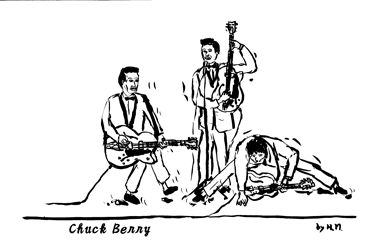

Among the instruments playing rock'n'roll, including drums or piano or sax, guitar is the most conspicuous one, I think, which is rivalled to vocal. To begin with, rock'n'roll is a lively music which contains, in addition to rhythm & blues derived from pre-war blues or big bands, rockabilly from country music like hillbilly and doo wop from gospel. And then what kind of instrument you choose as a main act seems to divide the music not only on the contents of songs but on the backgrounds of players : particularly guitar is considered as an instrument of 'the whites' rock'n'roll difficult to dance '. Chuck Berry's guitar also has the mood of blues, though, it should be largely influenced by fast-picking of strings-ridden country. That's why a man and a woman can have no time of expecting something while dancing when they hear the rhythms of Johnny B. Goode, rapid shuffle mingled with eight-beat. Some lyrics suggest Chuck Berry should have his own pride as a black man, but his music was easily accepted and imitated by white teens because of his innocent and straightforward guitar-ringing style.
On the liner notes of CDs I own, there are some Chuck Berry's short biographies which tell some names of his influences. His school mate, a textbook of tenor guitar, a neighborhood barber, Louis Jordan's swing jazz, T-Bone Walker or Muddy Waters' blues. They were his teachers before turning pro. When he gained some money with Johnnie Johnson trio in St. Louis, his repertoire was said to range from Nat King Cole's jazz standard, Muddy Waters to Hank Williams' country. He moved to Chicago and joined Chess to which Muddy Waters introduced him. His debut Maybellene was slightly based on a country tune Ida Red. As Chess was the head temple of Chicago blues, there are some who say like "Chuck doesn't forget the blues, no, never forget !". "On the Blues Side" is compiled by such a viewpoint, and surely let us hear Chuck's blues such as his early self compositions Wee Wee Hours,bNo Money Down or old jump blues like Confessin' the Blues. His playing style of guitar is, however, almost his own original. Electric guitar rings distorted and rough through the amplifier, and drums and bass beat the rhythm. Thanks to the schemes of DJs like Alan Freed, these tunes turned out to get their own name, rock'n'roll.
Not to mention his guitar, Chuck Berry is also a splendid poet. I am convinced that Black Eyed Handsome Man, a neatly witty tune with a hidden black pride, is his best. Reelin' & Rockin' has a formidable charm of looped melody, which is not monotonous but alluring thanks to the way of its rhyming. Moreover, the stories about speedy mobiles in Maybellene or You Can't Catch Me. The ways of discovering words in Thirty Days, Too Much Monkey Business, Roll Over Beethoven, or Sweet Little Sixteen, the last of which is the original of Surfin' U.S.A. of Beach Boys. The observation eye-sights towards the white-teen audience in School Day or Oh Baby Doll. The pathos in Downbound Train, Memphis, Tenessee and so on. You can find Chuck Berry's songs until 1957or 58 on "His Best, Volume 1" or the first of his two-disc best "The Anthology" glow brighter as the basis of rock'n'roll.
After '59 rock'n'roll became mild under the conservative pressure of societies in America and it cannot be denied Chuck Berry seemed to be frustrated in making ideas. It was partly because he got involved in trials on charges of forcing an under-aged woman to work in his own club and do something more and he was sentenced to imprisonment from '62 to '64. Discharged from prison, he was reappreciated thanks to his 'disciples' including Beatles, Rolling Stones and Beach Boys, and he released fine tunes in a clean frame of mind. Since teens in the heyday of rock'n'roll grew older, Nadine, No Particular Place to Go or Promised Land on "His Best, Volume 2" or the second disc of "The Anthology" seem to show well-aged Chuck Berry as the way he is. My Ding-A-Ling on the live of '70s London (its original is early 50s New Orleans big shot Dave Bartholomew's and it can be heard on "The Very Best of King/ Federal/ Deluxe Vol. 1" ) and Reelin' & Rockin' make a kind of conversation which is held knowingly between a rock star and the audience.
He has as many other episodes which cannot be all told here as Elvis Presley. I want to give some conclusion as follows : rock'n'roll became the whites' favorite on the one hand and it grew less acquainted with the blacks on the other, because rock'n'roll made stars with the help of TV or something and in a sense the audience got loyal to stars and then rock'n'roll came not to be easy to dance together for audiences. It is ironical that Chuck Berry, a black hustler who has spent full of turns and twists since he enjoyed his own success, finally has little black 'disciples'. Despite it, his guitar style never fade even today and it is attractive for me to play such a joyful thing. (2005/07/03)(2007/07/28)